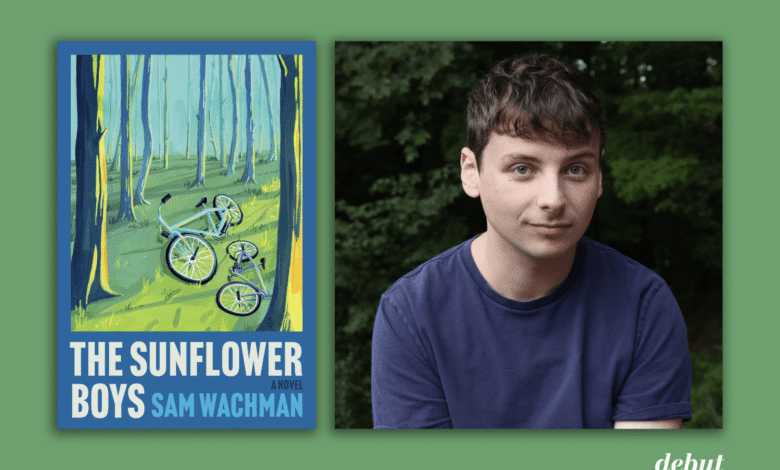The Sunflower Boys author Sam Wachman wants to shoutout Cindy, his neighborhood librarian – debutiful

In Sam Wachman‘s debut novel, The Sunflower Boys, brothers Artem and Yuri embark on a journey after war kills their family in rural Ukraine. As the journey unfolds, so does a beautifully constructed character study of Artem’s identity, loss of innocence, and blossoming love for his best friend.
Before writing his debut novel, Wachman taught English to primary schoolers in central Ukraine and worked with refugee families in Europe and the United States. His work has also appeared in Sonora Review, Berkeley Fiction Review, and New England Review.
We asked him to answer our recurring My Reading Life Q&A so readers could get to know her and the books that shaped his story.
What was the first book you were obsessed with as a child?
My neighborhood librarian (shoutout to Cindy!) handed me The True Meaning of Smekday by Adam Rex. It’s about multiple alien invasions, an underground colony of children living beneath an off-brand Disney World, and — in its own bizarre and incisive way — colonialism.
That was the first book that ever caught me in its snare and wouldn’t let go. I snuck it into synagogue, slipped it between the pages of the siddur, and read it during Saturday morning services.
I also have to mention My Side of the Mountain by Jean Craighead George, which my father read aloud to me as a bedtime story. My Side of the Mountain is the story of a boy named Sam who grows weary of life in New York City and runs away to live in a treehouse in the Catskills. As a boy named Sam who loves the woods and can’t stand the city, I keep returning to this book even as an adult.
What book helped you through puberty?
When I was fourteen, I was madly in love with various boys, none of whom returned my affections. I believed I was the first person in human history to suffer in this way. My pain was singular and unbearable.
That year, the aforementioned hero librarian Cindy handed me a copy of I’ll Give You the Sun by Jandy Nelson. Noah, one of the book’s two protagonists, is also fourteen and boy-crazy in ways he finds exciting and frustrating and frightening. That was the first time I realized that I could find catharsis in books.
Also, Nelson writes more like a painter than a writer. I mean that in the best way.
What book do you think all teenagers should be assigned in school?
It’s not the book that matters as much as the way the book is assigned. I graduated high school seven years ago. The English curriculum frustrated me because it treated novels as lifeless objects. “Describe the symbolism of the pickle dish in Ethan Frome. Identify three examples of synecdoche in this passage.” In first period biology, students dissect frogs; in second period English, they dissect books. These autopsies may help students memorize SAT words, but they will never ignite a young person’s lifelong love of literature.
Before memorizing and regurgitating the jargon of literary analysis, students should fall in love with the act of reading itself. They should be assigned novels that make them want to read more novels. They should learn to surrender to an unfamiliar consciousness for a few hundred pages. Reading is a skill; it requires empathy and an attention span, both of which are in short supply in 2025.
Once they’ve finished a novel and properly fallen in love, students should stagger around in a literary hangover for a day or two. They should discuss the novel aloud with their classmates, their teachers, their parents, maybe some strangers on the bus. Ideally, they should disagree. They should argue. There should be raised voices and fists banged on desks.
The good news is that there are thousands of excellent novels out there, waiting to land on the right teenager’s nightstand and change absolutely everything for them.
P.S. An excellent teacher can extend their excellence to any book. My own high school English teacher Ms. Maloney could have assigned a thousand-page guide to manufacturing drill bits, and I would have stayed up all night reading it.
If you were to teach a class on Damn Good Writing, what books would make the syllabus?
East of Eden by Steinbeck; Swann’s Way by Proust; Stoner by John Williams; take your pick of Cormac McCarthy; The Things They Carried by Tim O’Brien.
Some short stories as well: Raymond Carver’s A Small, Good Thing; Ethan Canin’s Batorsag and Szerelem; David Foster Wallace’s Forever Overhead.
What books helped guide you while writing your book?
In no particular order: Swimming in the Dark by Tomasz Jędrowski; The Toreadors from Vasyukivka by Vsevolod Nestayko; Dandelion Wine by Ray Bradbury; Shadows of Forgotten Ancestors by Mykhailo Kotsiubynsky; Enchanted Desna by Oleksandr Dovzhenko; We the Animals by Justin Torres; and The Orphanage by Serhiy Zhadan.
What books are on your nightstand now?
Pan by Michael Clune is sitting on top of Edible and Medicinal Mushrooms of New England and Eastern Canada by Dave L. Spahr. I recommend both.
Source link
